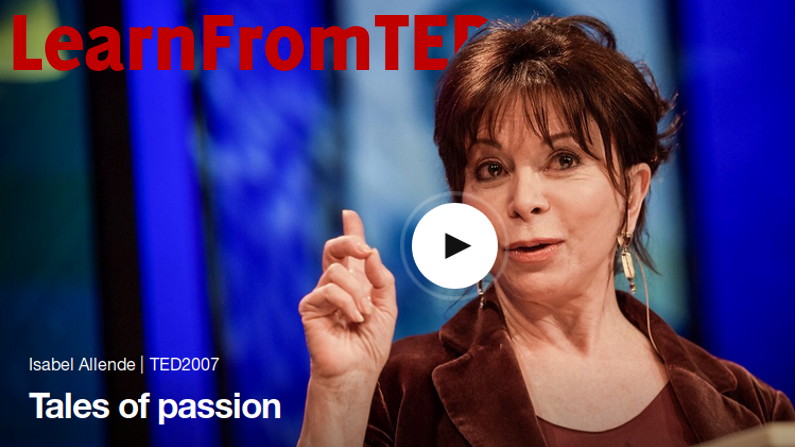#LearnFromTED with storytelling and an extraordinary guest: Isabel Allende. A tale of passion.
The opening is serious, almost clumsy in non-verbal communication (voice, facial expression) and in content:
“It’s really scary to be here among the smartest of the smart.”
A line that manages both to flatter the audience and the other speakers and create empathy for potential nervousness. Tension that is understandable, surely not the first time Isabel speaks before a crowd, but never before in a TED. A new environment and in a role very different from her own of a writer. Here is the first lesson to bring home: when public speaking we should build on our strengths. For Allende that is her pen, her uncanny ability to write and to tell stories. Thus in a different context, as in a presentation, rather than putting her chips on fancy slides or rhetoric, she choose a congenial field for her: the story,
“I’m here to tell you a few tales of passion. There’s a Jewish saying that I love. What is truer than truth? Answer: The story. I’m a storyteller. I want to convey something that is truer than truth about our common humanity.“
The opening is also personal, this warms up the audience and makes it more interesting, all good things to do at the beginning.
“All stories interest me, and some haunt me until I end up writing them.”
When somebody reads a known text it can be interesting listening because we love the content, although those are information we know to know. If it’s a personal opinion, or a personal story, suddenly we are not aware of what is going to be said.
At 1:08 introduction is over and begins the first section that last to around 7:20. This split in two is worth an analysis. There is an element that ties them: passion.
The first part is light with lots of humour, you can hear the audience laughing a lot (you probably did too). There is a serious passage when she talks about the Cambodian flag bearer, it’s matched by a graver facial expression. Then it’s back to humour. When she describes Sophia Loren and herself carrying the flag the atmosphere is more relaxed and so is Allende. She’s reading less than before, and the mimic accompanies the story. This initial section is funny, engages the audience and opens up their ears, eager to listen to what is coming next.
In the second part, from around 7:20 to around 16:20, the tone changes radically. It is still stories about women, now about their situation in many places in the world, and here there is no laughing matter. The bridge between the two sections is passion: the athletes passion and the one of who fight to survive or change conditions. Another link is Wangari Maathai, also a flag bearer in Turin. Those common point keeps the structure and the fluidity of the presentation. If she were to deliver a funny section totally unrelated to the next one this would be tactically right (humour fosters listening) but strategically wrong (audience wouldn’t be able to connect them and it would sound dissonant and distracting).
Try to think how this TED talk would be if the two sections were swapped!
The closing is emphatic, underlined by the voice, particularly here:
“I want to make this world good. Not better, but to make it good.”
A talk with over 4 million views that leverages content and storytelling skill, the visual aids are the vivid descriptions narrated by the writer.
To sum it up when you have to speak before a group build on your own set of skills, for Allende that is storytelling, in your case? If you can use humour to grab attention, do it appropriately with your presentation. The last piece of advice comes straight from Isabel:
“I need mavericks, dissidents, adventurers, outsiders and rebels, who ask questions, bend the rules and take risks. People like all of you in this room. Nice people with common sense do not make interesting characters. They only make good former spouses.”
Throw your passion in your presentations!


Recent Comments